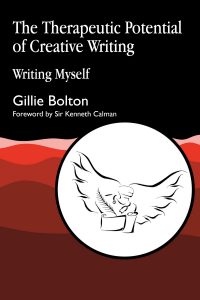 Jessica Kingsley Publications
Jessica Kingsley Publications
1999
Writing is a means of making sense of experience, and of arriving at a deeper understanding of the self. The use of creative writing therapeutically can complement verbal discussions, and offers a cost- and time-effective way of extending support to depressed or psychologically distressed patients. Suitable both for health-care professionals who wish to implement therapeutic writing with their patients, and for those wishing to start writing creatively in order to help themselves, The Therapeutic Potential of Creative Writing provides practical, well tried and tested suggestions for beginning to write and for developing writing further. It includes ideas for writing individually and for directing groups, and explores journal writing, poetry, fiction, autobiography and writing out trauma, with established writers and those who have taken up writing for private enjoyment.
CONTENTS:
- Introduction.
- Therapeutic writing: How and why: The healing pen
- Keeping a journal: `The diamonds of the dustheap’.
- Writing openers: Unbuttoning, opening the box
- Images: How to find, create and use them – Echoes.
- Dreams which put us in touch with ourselves: `The royal road’.
- The power of poetry, fiction, autobiography: `Something hatches’
- Waiting to help you take control of your own life: This is my decision!
- Writing and groups: Laugh and cry with each other.
- Writing out trauma: A bobble hat, a pair of jeans, and Grandad.
- Writing at the doctor’s, the hospital, the hospice: Writing on prescription.
- Writing in prison, the old people’s home: `Reach for the stars’.
- Approaches to therapeutic writing: `But who are you?’
- Conclusions: `Thought made flesh’.
- Appendix .Useful contact addresses. Bibliography. Index.
Reviews and Praise
‘This is a bubbling cauldron of a book. I doubt if I have ever felt so driven to follow an author’s enthusiasm to try out her ideas. Just take a sheet of paper and a favourite pen, she says, and for six minutes write whatever comes to mind. So I did, and what happened surprised me, because I hadn’t really thought much of the notion. Gillie Bolton runs creative writing courses, and counsels and works as a therapist. She is convinced that writing is a true, gentle and accessible way for anyone to express themselves and that this can lead on to new understanding through rereading and perhaps revising the writing. She shows how the slowing down of thoughts to the pace of a pencil is an editing process that helps order ideas out of the internal chaos, but not one that stultifies subconscious experience from leaking out…We are shown how to get started and allow people to feel that it is not only safe but that it might also be fun, to let their pens flow across the page. Examples are given of therapeutic writing groups in prisons, hospices, among demented patients and he mentally ill, for such groups can thrive in surprising settings. Gillie Bolton runs writing groups for GP’s and makes the case that, instead of a prescription, doctors could offer certain patients a pen and a blank sheet of paper and then be willing to read whatever they might write.’
The British Journal of General Practice
‘Writing Myself is a textbook for writing therapy, and a very good one. Writing therapy is a fairly new discipline, which uses creative writing to help people face problems by exploring and expressing them in writing. The book’s suggestions for workshops are, in my mind, the most interesting part of it. The variety of subjects the therapy uses to evoke ideas and bring back memories is amazing. It was interesting to read the different writings that came out of one workshop with smell as the theme. Everyone had the same stimulus but not one idea was duplicated…There are parts of the book that can have a real relevance to people with arthritis. My favourite was a man who wrote a letter to his shoulder, explaining how he felt about it giving up on him at unpredictable times…The art of journal writing is also comprehensively covered in the book. Journal writing is a method of keeping track of day-to-day feelings, rather than appointments in a diary. If you feel able to share this with your rheumatologist you have a valuable record of your “non-medical” symptoms.’
Arthritis News
‘Occasionally I have suggested to parents that they write down some of their thoughts and feelings in the form of a journal or a letter. Nearly always the act of writing seems to have a curious therapeutic effect. Thanks to Gillie Bolton’s book, I shall be doing this more often. Gillie believes that while it is good to talk, it is even better to write. She teaches therapeutic writing to doctors, nurses, clients, prisoners, just about anybody who is interested…I am certainly going to do some therapeutic writing myself now and then, when I am ready, I shall suggest it to some of my troubled patients. If you read this book (and I think you should), you will want to be doing it too.’
Family Practice
‘This book is aimed at at those of us, including therapists, who are interested in using creative writing as a way in which we can get to know ourselves better. A ‘straight-forward how-to guide to therapeutic writing’ this book ‘offers endlessly creative questions and tantalising paths to follow’…for those therapists interested in using creative writing for themselves or with their clients, this book may provide inspiration.’
British Journal of Occupational Psychology
‘The book offers explicit guidance on how to engage in, and how to help others engage in, therapeutic writing. But it also offers insight into why such writing is effective as a healing agent…Bolton’s books will be invaluable to a wide range of mental health workers and human potential practitioners and to people seeking a means of addressing their own suffering and aspirations for self-understanding and self-expression…an excellent addition to the reading lists of counsellor training courses, especially in connection with personal development components. Not to be missed, either, is the potential for this kind of therapy to be added to the creative repertoire of practitioners needing to maximise therapeutic benefits in a short time by stimulating client ownership of the therapeutic process.’
British Journal of Guidance and Counselling
‘Creative writing may seem at first glance to be a long way from nurse education, but this would be a mistaken judgement. Gillie Bolton is a published poet who has worked with a range of those who work in health care – clients, students and experienced practitioners – to develop their skills in writing for themselves. Creative writing offers a process of self-exploration which is under the control of the writer and which promotes self-healing. Her book offers ideas and inspiration whichever hat you choose to wear.
All of us have sore places in personal and professional lives which are easy to ignore much of the time, but which can pop up unexpectedly and cause trouble. Nurse educators may need to revisit difficult times in their own career, and creative writing offers an easily accessible and confidential way to do this. Those wishing to find new ways of encouraging students to write diaries which are reflective in reality as well as in name will find new approaches in this book.
Educators may also be stimulated to consider the ethics of the assessment of reflective diaries by comparison with the standards of a different discipline. Finally there are specific areas of health care in which creative writing can be of particular help to clients – palliative care, care of the elderly and mental health are three which feature in this book. Gillie Bolton emphasises that creative writing can not take people any further than they wish to go – unlike therapeutic talk which can sometimes result in both client and nurse getting out of their depth. Nurses who use this tool to help their patients heal themselves should therefore be careful how they discuss what has been written. Above all, those who encourage others to write creatively should first try it. So buy this book- but be warned, it can be addictive!’
Elizabeth R Perkins MA PhD Cert Ed
‘Many people find that writing their thoughts down is therapeutic. It can clarify the vague ideas and feelings wandering around in one’s head and illuminate them. I can highly recommend a new book that helps with this process: The Therapeutic Potential of Creative Writing: Writing Myself. The author, Gillie Bolton, is research fellow in medical humanities at Sheffield University Institute of General Practice and an award-winning poet. She works with groups, which include health professionals, as a faclilitator. Members of the groups have found it life enhancing, healing and nurturing to express themselves in this way. Many have introduced patients, clients and students to it. Her book explores the potential of writing as therapy in a straightforward ‘how to’ guide. It explores the use of journal writing, fiction and poetry and is full of practical ideas.’
Dr Moira Brimacombe, Sheffield
‘The book is eminently practical. It provides a wide range of valuable suggestions for working with clients, with groups, and for working on one’s own. It is also clearly written…I would highly recommend this book as being useful, accessible and above all, written with compassion.’
Dr Christina Mason, St Josephs Hospice, London
‘Both patients and professionals find that writing down their thoughts-be it in a diary, a poem or a 300 page novel-can be highly therapeutic. Gillie Bolton’s book emphasises the role of creative writing and begins an evaluation of its potential as a sort of alternative therapy. The author is a research fellow in medical humanities at Sheffield University Institute of General Practice, and trains both health professionals and patients. The book is a logically organised ‘how to’ guide and even if you have no thoughts on the therapeutic benefits of creative writing, it is a good read. Excerpts from patients’ diaries, short stories and the poetry are particularly enjoyable. I approached the book with a degree of ambivalance, but am now thinking of broaching the subject with some of my chronically ill patients.’
Education
‘I should stress that The Therapetic Potential Of Creative Writing is no academic treatise. There is plenty of material here for a counsellor who wants to use writing with clients to write on their own (individually or as a couple), and it may even inspire counsellors themselves to pick up a pen and explore what’s going on inside. Some of the techniques will probably be familiar already … list-making, for example, as a basic but valuable tool for clarifying fears, anxieties, pros and cons etc – but all the suggestions in this stimulating book are based on good practice and reflect the author’s own belief that you can’t write the wrong thing. Try it for yourself and see.’
Relate
‘One of the most notable trends in creative writing in recent years has been the preoccupation with writing as therapy. Now, Gillie Bolton has sensibly written a book which collates much of this thinking, and does so with a very readable fusion of practical ideas and reports on previous thinking on the subject. But what is particularly interesting is that she has been involved in practical applications, working with general practitioners. Therefore, in some ways, Gillie Bolton is leading the field. Her book will provide a useable basis for workshops and tutoring processes related to writing as therapy. The material covered by the book is so comprehensive that tutors from all levels and contexts will find a mine of practical information. We should welcome this book as the first attempt to present a comprehensive overview of that area of creative verbal art which obviously has social use in addition to academic status. Even better, the discussions are never solemn, and humour often plays a part in the examination of case-studies and experiences.
Writing In Education
‘Gillie Bolton is a Research Fellow in Medical Humanities. For ten years she has trained doctors, nurses and counsellors to offer therapeutic writing to clients, as well as working with patients and groups herself. She writes with enthusiasm and clarity; her quotations are stimulating and add new dimensions to her theories. She does not use jargon nor does she oversimplify. The concise chapter headings help to make reference easy… This book does not offer miracle cures or psychology. It describes routes to understanding ourselves, our lives and each other.’
Towards Wholeness
Buy here
ISBN: pb 1-85302-599-2

